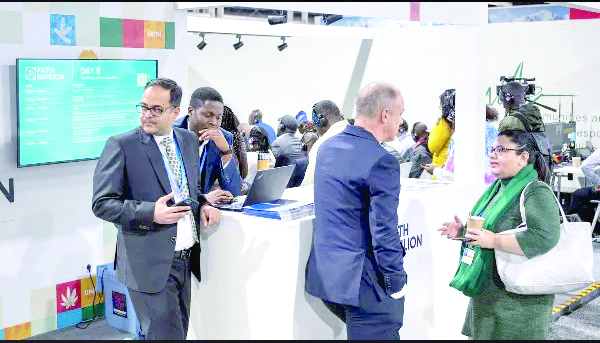Faith Pavilion at COP29 reviews mobilising communities for effective action
By Milliam Murigi, November 22, 2024Faith-based organizations from across the world are calling upon the Global North governments and corporations to stop funding fossil fuel projects and instead prioritize funding renewable energy.
Speaking yesterday in Baku during the ongoing 29th Conference of the Parties to the United Nations Framework Convention on Climate Change (COP29), the organizations said that financing fossil fuel is like financing funerals instead of the future.
Led by GreenFaith Africa, the organizations say that a shortage of compassion, love, and justice results in inadequate renewable energy finance and financiers should bank on love, not greed.
Fuel exploration
“Communities are being affected because of these fossil fuel projects yet nothing is done. People continue to lose their livelihoods and properties, and others are displaced because of fossil fuel exploration yet nothing is done about it. Governments continue to approve these projects without listening to the communities who are majorly affected,” says Gifty Agbenyefia from Ghana.
According to her, grassroots organizations are working tirelessly at the community level to highlight the disproportionate impact that fossil fuel projects have on vulnerable populations, particularly in the Global South. These grassroots efforts are pushing for greater accountability and more inclusive dialogue in decision-making processes. However, the voices of the most affected those who live in the regions where these projects are being carried out are not heard.
This exclusion of local voices from the decision-making processes not only deepens inequality but also undermines the principles of justice and fairness. According to Pius Oko, GreenFaith Head of Program, there is a need for the establishment of more inclusive mechanisms where local populations have a say in the projects that affect their lives, urging policymakers to prioritize people over profit.
Without these changes, they warn, the harmful cycle of environmental degradation and social injustice will continue, disproportionately affecting vulnerable populations in the Global South.
“Transition from the culture of exploitation to one of stewardship and care for the Earth. It’s time we invest in a future that is sustainable, equitable, and just for all,” said Oko who comes from Nigeria.
According to him, in Nigeria, fossil fuel companies have acted as assassins in foreign lands, leaving a trail of destruction in communities like Ayetoro and Ogoni, where oil exploration has wreaked havoc.
The environmental degradation caused by these companies, including oil spills and the poisoning of local water sources, has decimated entire ecosystems, leaving communities without clean water, fertile land, and their livelihoods.
The companies, he argues, have been responsible for widespread displacement, loss of income, and irreversible damage to the environment, all in pursuit of profits, while the affected communities remain voiceless in the decision-making processes. He calls on the global community to hold these corporations accountable and prioritize the health and well-being of local populations over corporate greed.
On her side, Hening Purwati, from GreenFaith Indonesia, says that apart from diverting money to renewable energy, climate finance that is being advocated for at COP29 should also be made accessible at the grassroots levels because currently despite global pledges and financial promises to address climate change, the funds are not reaching the communities most impacted by environmental disasters.
Instead, the financing remains trapped in complex bureaucratic systems or is misdirected, leaving local populations vulnerable to the growing impacts of climate change.
“Climate finance at the grassroots levels is a fallacy. The people who are most affected by climate change are not seeing the benefits of these large financial pledges. Global leaders should ensure that these funds directly support communities, particularly those in frontline areas facing the brunt of environmental degradation,” says Purwati.
